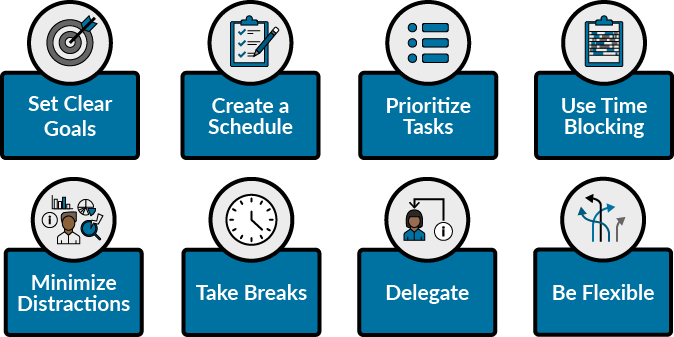Tips for Time Management
Here are some steps and tips for proper time management:

- Set clear goals: Identify your priorities and set realistic goals for what you want to achieve. This will help you stay focused and motivated.
- Create a schedule: Create a schedule that reflects your priorities and goals. Use a planner, calendar, or time management app to help you stay on track.
- Prioritize tasks: Rank your tasks in order of importance and tackle the most important ones first. This will help you make progress on your most pressing goals. In time management, the Pareto Principle or the 80/20 rule states that 80% of the results come from 20% of the effort. By prioritizing tasks based on their importance and urgency, you can focus your efforts on the 20% of tasks that will yield 80% of the results. This helps to ensure that your time is used efficiently and effectively, and that you are not wasting time on tasks that are low-priority or have little impact. Prioritizing tasks based on their importance and urgency can help you make the most of your time and achieve better results.
- Use time blocking: Time blocking involves scheduling a block of time for a specific task or activity. This helps you focus on one thing at a time and avoids multitasking, which can be counterproductive.
- Minimize distractions: Identify potential distractions and take steps to minimize them. For example, turn off notifications on your phone or close your office door to avoid interruptions.
- Take breaks: Taking breaks can actually improve productivity by giving your brain a chance to rest and recharge. Make sure to take regular breaks throughout the day.
- Delegate: Effective delegation can help save time and increase productivity, as it allows the person delegating to focus on more important tasks or areas of responsibility. However, delegation requires careful consideration of each team member’s skills and abilities, as well as clear communication of expectations and deadlines. Failure to delegate effectively can lead to time management issues and decreased productivity.
- Be flexible: Things don’t always go according to plan, so be prepared to adjust your schedule and priorities as needed.
Remember, effective time management requires self-discipline and practice, but the benefits are well worth the effort!